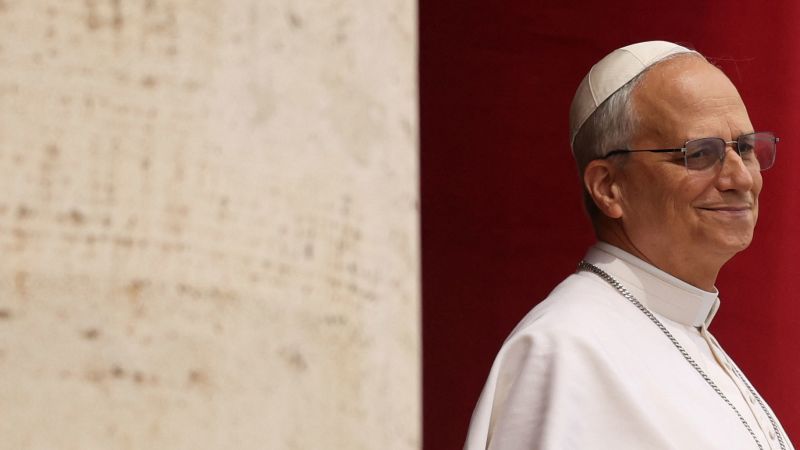Pope Leo XIII And The Catholic Church: Building Bridges, Implementing Reform

Welcome to your ultimate source for breaking news, trending updates, and in-depth stories from around the world. Whether it's politics, technology, entertainment, sports, or lifestyle, we bring you real-time updates that keep you informed and ahead of the curve.
Our team works tirelessly to ensure you never miss a moment. From the latest developments in global events to the most talked-about topics on social media, our news platform is designed to deliver accurate and timely information, all in one place.
Stay in the know and join thousands of readers who trust us for reliable, up-to-date content. Explore our expertly curated articles and dive deeper into the stories that matter to you. Visit Best Website now and be part of the conversation. Don't miss out on the headlines that shape our world!
Table of Contents
Pope Leo XIII and the Catholic Church: Building Bridges, Implementing Reform
Pope Leo XIII (1810-1903) reigned over the Catholic Church during a period of immense societal upheaval. The rise of nationalism, industrialization, and socialist ideologies presented unprecedented challenges to the Church's authority and influence. Yet, Leo XIII's papacy (1878-1903) is remembered not for resisting change, but for skillfully navigating these turbulent waters through a program of deft diplomacy and significant internal reforms. This approach, focused on building bridges with the modern world while addressing internal issues, cemented his legacy as a pivotal figure in the late 19th-century Catholic Church.
<h3>Responding to Modernity: A Pragmatic Approach</h3>
Leo XIII's papacy was defined by his pragmatic approach to modernity. Unlike some predecessors who viewed modern ideas with suspicion, Leo XIII recognized the need for the Church to engage with the intellectual and social currents of his time. This engagement wasn't about compromise on core doctrines, but rather about finding common ground and addressing legitimate concerns.
One of his most significant contributions was his engagement with the burgeoning socialist movement. While firmly rejecting Marxist materialism, his encyclical Rerum Novarum (1891) acknowledged the injustices of industrial capitalism and advocated for the rights of workers. This landmark document, often credited with launching Catholic social teaching, called for fair wages, humane working conditions, and the right to form unions – positions that resonated with many, bridging a significant gap between the Church and working-class communities. Rerum Novarum remains highly influential today, inspiring ongoing discussions about social justice and economic fairness. You can read more about its impact .
<h3>Internal Reform and Strengthening the Church</h3>
Beyond his external engagement, Leo XIII implemented vital internal reforms. He emphasized the importance of education, promoting the establishment of Catholic schools and universities to counter secularizing influences. He also strengthened the Church's missionary efforts, particularly in Africa and Asia, extending its global reach and influence.
Further demonstrating his commitment to reform, Leo XIII promoted a renewed emphasis on liturgical practices and a deeper engagement with scripture. This revitalization fostered a more vibrant spiritual life within the Church, countering the perceived rigidity that had alienated some.
<h3>Reconciliation and Diplomacy: Mending Fences</h3>
Leo XIII understood the importance of diplomatic engagement. He sought to improve relations with other Christian denominations, initiating dialogue and fostering a spirit of ecumenism – a significant departure from previous, more confrontational approaches. While full unity remained elusive, his efforts laid the groundwork for future interfaith dialogue.
His efforts also extended to repairing strained relationships with various nations. He skillfully navigated complex political landscapes, prioritizing peace and understanding amidst rising nationalistic tensions.
<h3>A Legacy of Adaptability and Reform</h3>
Pope Leo XIII's papacy stands as a testament to the Church's capacity for adaptation and reform. His ability to address the challenges of modernity while upholding core Catholic teachings left an enduring mark. He showed that the Church could be both a guardian of tradition and a force for positive change in the world. His legacy continues to inspire discussions on social justice, interfaith dialogue, and the Church's role in a rapidly changing world. His approach serves as a crucial example of how religious institutions can navigate complex social and political landscapes effectively. By bridging divides and embracing reform, Leo XIII left behind a profound and lasting influence on the Catholic Church and the world at large.

Thank you for visiting our website, your trusted source for the latest updates and in-depth coverage on Pope Leo XIII And The Catholic Church: Building Bridges, Implementing Reform. We're committed to keeping you informed with timely and accurate information to meet your curiosity and needs.
If you have any questions, suggestions, or feedback, we'd love to hear from you. Your insights are valuable to us and help us improve to serve you better. Feel free to reach out through our contact page.
Don't forget to bookmark our website and check back regularly for the latest headlines and trending topics. See you next time, and thank you for being part of our growing community!
Featured Posts
-
 Padres Fall To Rockies In 9 3 Loss May 11 2025 Game Summary
May 13, 2025
Padres Fall To Rockies In 9 3 Loss May 11 2025 Game Summary
May 13, 2025 -
 Uk Pm Unveils Stricter Migration Policies As Zelenskyy Seeks Direct Putin Dialogue
May 13, 2025
Uk Pm Unveils Stricter Migration Policies As Zelenskyy Seeks Direct Putin Dialogue
May 13, 2025 -
 Manny Machados 2025 Performance A Deep Dive Into His Success
May 13, 2025
Manny Machados 2025 Performance A Deep Dive Into His Success
May 13, 2025 -
 Remembering Samuel French Killers Of The Flower Moon Actor Passes Away At 45
May 13, 2025
Remembering Samuel French Killers Of The Flower Moon Actor Passes Away At 45
May 13, 2025 -
 Immigration Crackdown And Potential Putin Zelenskyy Summit Dominate News
May 13, 2025
Immigration Crackdown And Potential Putin Zelenskyy Summit Dominate News
May 13, 2025
Latest Posts
-
 Mandelsons Dismissal A Deeper Look At The Controversial Face Of Evil Headline
Sep 13, 2025
Mandelsons Dismissal A Deeper Look At The Controversial Face Of Evil Headline
Sep 13, 2025 -
 Political Fallout Analyzing The Face Of Evil And Mandelson Dismissal
Sep 13, 2025
Political Fallout Analyzing The Face Of Evil And Mandelson Dismissal
Sep 13, 2025 -
 Star Trek Strange New Worlds Season 3 Finale Anson Mount Discusses Pikes Fate
Sep 13, 2025
Star Trek Strange New Worlds Season 3 Finale Anson Mount Discusses Pikes Fate
Sep 13, 2025 -
 Brian Cashman Provides Straight Talk On Anthony Volpes Yankees Prospects
Sep 13, 2025
Brian Cashman Provides Straight Talk On Anthony Volpes Yankees Prospects
Sep 13, 2025 -
 Giants Pitcher Chapman Escapes Suspension Receives Fine Instead
Sep 13, 2025
Giants Pitcher Chapman Escapes Suspension Receives Fine Instead
Sep 13, 2025
